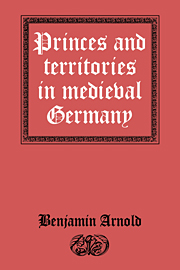Book contents
- Frontmatter
- Contents
- Acknowledgements
- List of abbreviations
- Introduction
- PART I CROWN AND PRINCE
- PART II PRINCELY TITLE AND OFFICE
- PART III DYNASTIES, PRELATES, AND TERRITORIAL DOMINION
- 8 From consanguinity to dynasty?
- 9 Material foundations: colonization, forest, towns, and communications
- 10 The reform of regional jurisdictions in the twelfth and thirteenth centuries
- 11 The anatomy and nomenclature of princely dominion, 1150–1330
- 12 Feuds, inheritance, and partition
- 13 Region and territory: effects and outcome
- Conclusion
- Index
9 - Material foundations: colonization, forest, towns, and communications
Published online by Cambridge University Press: 03 December 2009
- Frontmatter
- Contents
- Acknowledgements
- List of abbreviations
- Introduction
- PART I CROWN AND PRINCE
- PART II PRINCELY TITLE AND OFFICE
- PART III DYNASTIES, PRELATES, AND TERRITORIAL DOMINION
- 8 From consanguinity to dynasty?
- 9 Material foundations: colonization, forest, towns, and communications
- 10 The reform of regional jurisdictions in the twelfth and thirteenth centuries
- 11 The anatomy and nomenclature of princely dominion, 1150–1330
- 12 Feuds, inheritance, and partition
- 13 Region and territory: effects and outcome
- Conclusion
- Index
Summary
In examining the mutual rights of the princes and the crown (chapters 1–2), the varied meaning of princely titles (chapters 5–7), and the transition in the aristocracy from consanguinity to dynasty (chapter 8), we could perceive that the secular and ecclesiastical princes possessed immense institutional potential for local domination in the German Empire. Since the royal court did not dispose of resources, techniques, or ideas adequate to the centralization of Germany, princes and kings did not have to face up to serious confrontations about the exercise of power in the regions, although there was still plenty of scope for political quarrels between them. The crown continued to be a strong and versatile force in German affairs throughout medieval times, but it tacitly conceded that the aims of justice, peace, and order would have to fall within the province of princes too, if they were to be fulfilled at all. In the twelfth century there were good reasons why the princes were in a stronger position to entrench the necessary jurisdictions on the local scale. They were being provided with a revised regional substructure which did eventually propel them towards more territorial forms of rule, as the domini terrae of the thirteenth and fourteenth centuries.
- Type
- Chapter
- Information
- Princes and Territories in Medieval Germany , pp. 152 - 185Publisher: Cambridge University PressPrint publication year: 1991



